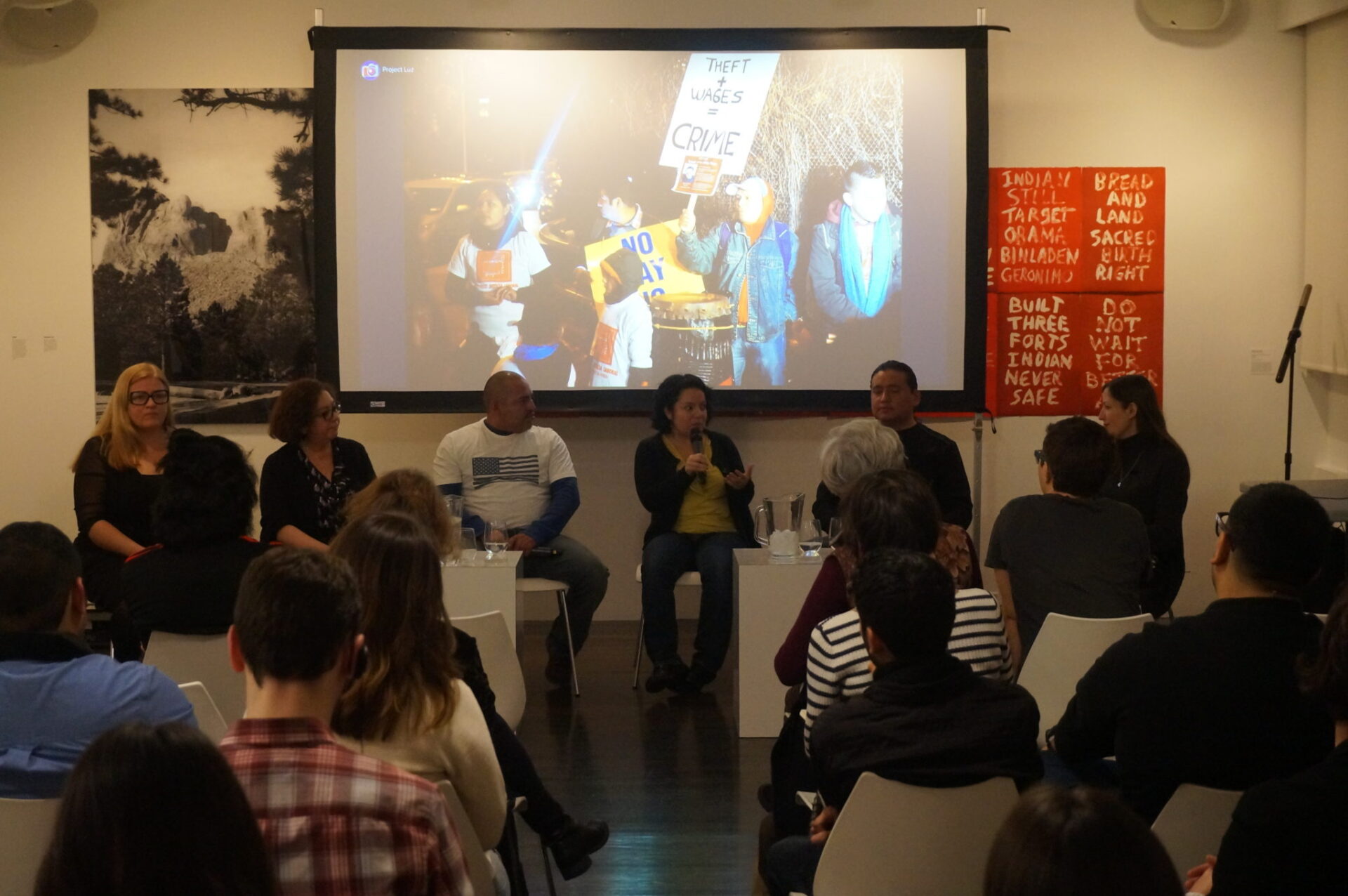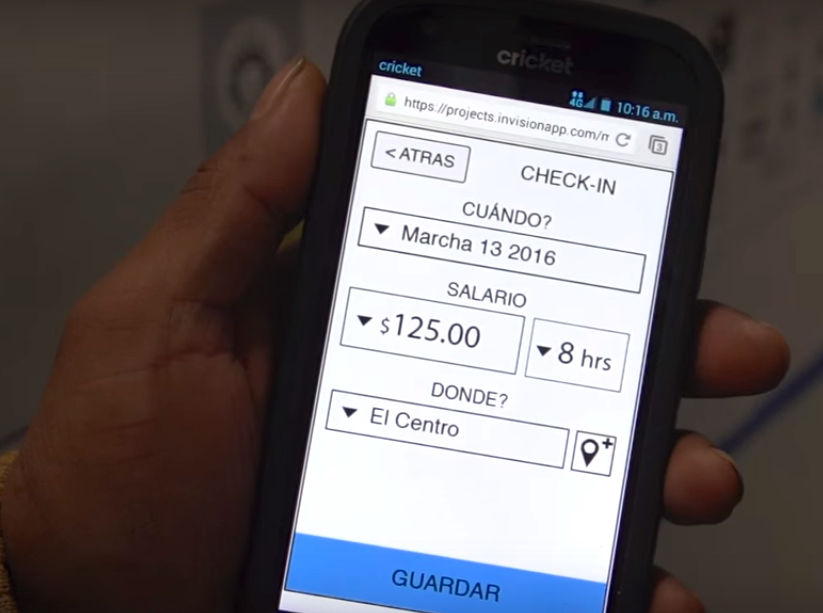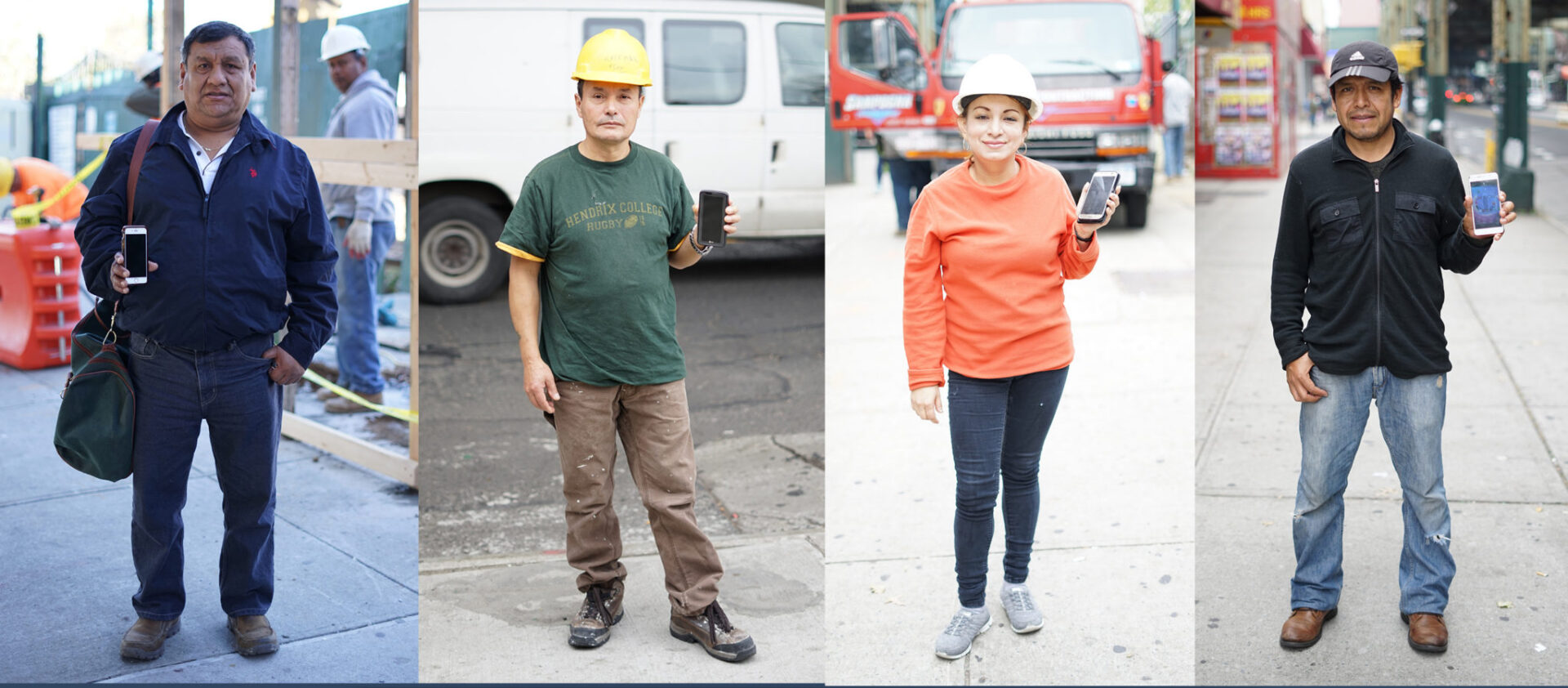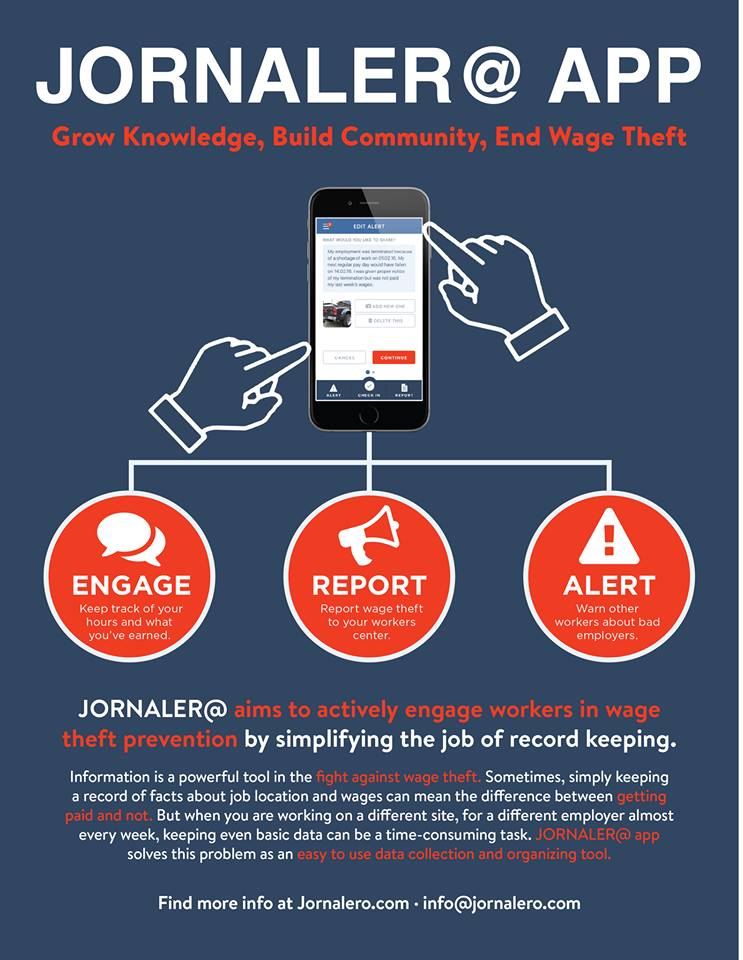2015 ABOG Fellow Sol Aramendi’s Apps for Power is a collaborative project with immigrant day laborers, artists, organizers, developers, and lawyers. Together they developed the Jornaler@ App, a smartphone app that fights wage theft by allowing users to safely share their experiences and report abusive and neglectful employers.
ABOG hosted a live conversation about Apps for Power in Spanish at The 8th Floor on February 23, 2016. Moderated by ABOG’s Director of Programs Elizabeth Grady, it featured artist Sol Aramendi alongside collaborators Maria Figueroa, Director of Labor and Policy Research at the Worker Institute of Cornell University; Nadia Marin, labor organizer and attorney; Omar Trinidad, day laborer, app co-designer, and organizer for New Immigrant Community Empowerment; and Felix Guzman, day laborer and organizer for Staten Island Community Job Center. Telesh Lopez from Caracol Interpreters Coop provided simultaneous interpretation via headsets for English-speaking guests.
In celebration of the app’s official launch this week, selections from the conversation featuring project collaborators are below, first an English translation followed by a version in Spanish. If you would like to listen to the entire conversation in Spanish it is available here.

Reports from the Field: Apps for Power, The 8th Floor, February 23, 2016. From left to right: Sol Aramendi, Maria Figueroa, Felix Guzman, Nadia Marin, Omar Trinidad and Elizabeth Grady. Photo: Joelle Te Paske/ABOG
Elizabeth Grady (EG): What did you expect working with an artist to be like? Was working with Sol like what you expected?
Omar Trinidad (OT): I’d never worked with art. It was a nice experience to express the needs of day laborers through photos, videos, and really nice, illuminated pictures. Art is a way of expressing the needs of the worker, of the day laborer.
Felix Guzman (FG): Underneath art there can be an expression, and from the expression, some need. From the need, a message can emerge. Through this people can understand the needs of the problem that we, that day laborers have. So for us it’s not just art, but a message.
Maria Figueroa (MF): Cornell University has been working with worker’s organizations and not many combine art with the struggle for labor rights. When we saw the chance to collaborate with an artist, it seemed like a great opportunity because we could do something innovative. That’s what art attracts: a different way of looking at things. Like Felix and Omar said, it helps articulate a message. So we have a message for the struggle.
EG: Can you talk a little bit more about how you can use the app? Why it is needed?
FG: There were cases where people came to pick up workers for roofing and wouldn’t pay them for the day or week worked. With this app we take the license plate number and color of the vehicle, and put it in the app and say that the specific person isn’t paying. It’s not just going to be in New York and New Jersey. It’s going to be national. We’re going to let it be known that that person is a danger to workers.

Screenshot courtesy Project Luz Youtube.
OT: Their picture will come out instantly in the app. Word will spread: “Be careful of this person, this is someone who doesn’t pay. [This is someone] who exploits the day laborer.” We’re going to be on the lookout. We’re going to be connected.
Nadia Marin (NM): Generally a job complaint is filed with the Department of Labor and they might recover that money, or they might not, but that’s where that information stays. With the app, information is shared about the contractor. So, it’s not simply putting a complaint to recover my money, but rather it’s doing something to help inform the entire community.
EG: What was the moment when you knew this was really important?
FG: We needed a weapon to attack wage theft. Doing it by myself, or in a small group, it couldn’t be done. It had to be done united [with others]. We found that we belong to a greater group. I thought that it was just going to be Staten Island, but it wasn’t just Staten Island. Now, we’re going to the national level.
OT: It has also helped to educate workers about their rights. A lot of people were scared of reporting wage theft because their bosses said that they were going to call immigration. This app will educate workers about how they lie and that everyone has the same rights. Don’t be afraid to report the wage theft.
EG: Is there anything else that you want to make sure people know?
NM: I think that the app project can be, and I hope will be, an example that can be used in other industries. It’s not just for day laborers and day laborer organizations, because in so many industries there’s wage theft. The app can be used for domestic workers, for workers in nail salons, for workers in all industries where we know that there’s wage theft and where we need to find ways to combat it.
Like Jornalero Wage Theft App on Facebook
Read more via The New York Times
Luchar contra el robo de salarios con Aplicaciones para el Poder
Aplicaciones para el Poder (Apps for Power), de la becaria de ABOG de 2015 Sol Aramendi, es un proyecto colaborativo entre jornaleros, artistas, organizadores, desarrolladores y abogados. Juntas, estas personas desarrollaron Jornalero Wage Theft App (que se podría traducir como la Aplicación contra el Robo de Salarios del Jornalero), una aplicación para teléfonos inteligentes que lucha contra el robo de salarios al permitirles a los usuarios que compartan sus experiencias de forma segura y reporten a los empleadores abusivos y negligentes.
El 23 de febrero de 2016 ABOG fue anfitriona de una conversación en español y en vivo sobre Apps for Power, en un espacio llamado The 8th Floor. Fue moderada por Elizabeth Grady e incluyó a la artista Sol Aramendi junto con las y los colaboradores María Figueroa, directora de Investigación Laboral y de Política Pública en el Worker Institute de Cornell University; Nadia Marín, organizadora sindical y abogada; Omar Trinidad, jornalero, codiseñador de la aplicación y organizador para New Immigrant Community Empowerment (NICE); y Félix Guzmán, jornalero y organizador para el Centro de Trabajo de Staten Island. Telesh López, de Caracol Interpreters Coop, brindó interpretación simultánea a través de audífonos para las y los invitados que hablaban solo inglés.
Si usted desea escuchar la conversación entera en español, está disponible aquí.
Elizabeth Grady (EG): ¿Qué es lo que ustedes esperaban de trabajar con una artista? ¿Trabajar con Sol fue como esperaban que fuera?
Omar Trinidad (OT): Yo nunca había trabajado con arte. Fue una experiencia el expresar las necesidades de los jornaleros por medio de fotos, videos y fotos muy bonitas e iluminadas. El arte es una forma de expresar las necesidades del trabajador, del jornalero.
Félix Guzmán (FG): Bajo el arte puede haber una expresión, alguna necesidad. De la necesidad, puede surgir un mensaje. Por medio de esto, la gente puede entender las necesidades del problema que nosotros, los jornaleros, tenemos. Entonces, para nosotros, no es solo arte, sino un mensaje.
María Figueroa (MF): La Universidad de Cornell ha estado trabajando con organizaciones de trabajadores y no muchas combinan el arte con la lucha por los derechos laborales. Cuando vimos la oportunidad de colaborar con una artista, nos pareció una oportunidad genial porque podíamos hacer algo innovador. Eso es lo que trae el arte: una forma diferente de ver las cosas. Como dijeron Omar y Félix, ayuda a articular un mensaje. Entonces tenemos un mensaje para la lucha.
EG: ¿Pueden hablar un poco más sobre cómo ustedes pueden usar la aplicación? ¿Por qué es necesaria?
FG: Había casos donde la gente venía a buscar trabajadores para trabajos de techado y no les pagaban por el día o la semana de trabajo. Con esta aplicación, tomamos la placa y el color del vehículo y lo ponemos en la aplicación y dejamos saber que esa persona en específico no está pagando. No va a funcionar solamente en Nueva York y Nueva Jersey. Va a ser a nivel nacional. Vamos a dejar saber que esa persona es un peligro para los trabajadores.

Courtesy Jornaler@ App on Facebook.
OT: Su foto va a salir instantáneamente en la aplicación. Se va a correr la voz: “Ten cuidado con esta persona, es alguien que no paga. [Esta persona es alguien] que explota al jornalero”. Vamos a estar pendientes. Vamos a estar conectados.
Nadia Marín (NM): Generalmente, se pone una queja con el Departamento del Trabajo y puede ser que se recupere el dinero, o puede ser que no, pero ahí se queda la información. Con la aplicación, se comparte la información sobre el contratista. Entonces, no se trata simplemente de poner una queja para recuperar mi dinero, sino que más bien se está haciendo algo para ayudar a informar a toda la comunidad.
EG: ¿En qué momento supieron que esto era algo bien importante?
FG: Necesitamos un arma para atacar el robo de salarios. Si lo hago yo solo, o en un grupo pequeño, no se puede hacer. Tiene que hacerse [con otras personas]. Hemos descubierto que somos parte de un grupo más grande. Yo pensaba que iba a ser solo para Staten Island pero no era solo Staten Island. Ahora nos vamos a nivel nacional.
OT: También ha ayudado para educar a los trabajadores sobre sus derechos. Mucha gente tenía miedo de reportar el robo de salarios porque sus patronos decían que iban a llamar a Inmigración. Esta aplicación educará a los trabajadores sobre cómo mienten y sobre cómo todos tenemos los mismos derechos. No tengan miedo de reportar el robo de salarios.
EG: ¿Hay algo más que quieran que la gente sepa?
NM: Yo pienso que el proyecto de la aplicación puede ser, y espero que sea, un ejemplo que se pueda usar en otras industrias. No es solo para jornaleros y organizaciones de jornaleros, porque en muchas industrias existe el robo de salarios. La aplicación puede ser de uso para las trabajadoras del hogar, las trabajadoras en los salones de uñas, las y los trabajadores en todas las industrias donde sabemos que hay robo de salarios y donde necesitamos encontrar formas de combatirlo.
Siga la aplicación de “Jornalero Wage Theft” en Facebook.
Lea más sobre esto en el New York Times.

Courtesy Jornaler@ App on Facebook.